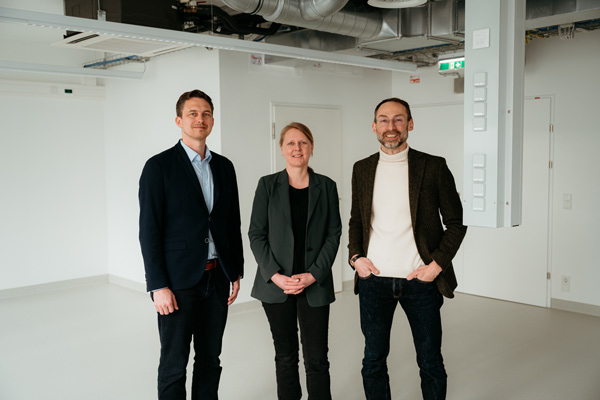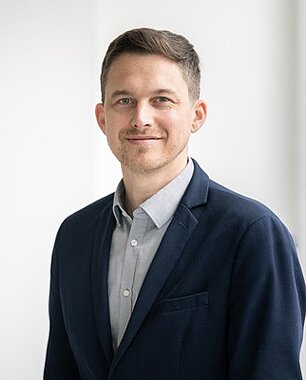 © ÖAW/Natascha Unkart
© ÖAW/Natascha Unkart
How AITHYRA Connects AI and Life Sciences in Vienna
AITHYRA is a new internationally oriented institute of the Austrian Academy of Sciences (ÖAW) located at the Vienna BioCenter. It brings together experts in artificial intelligence (AI) and biomedical research. Georg Winter, Life Science Director at AITHYRA, talks about the institute’s milestones, its future, and Austria as a location.
Mr. Winter, you’ve been Scientific Director for Life Sciences at AITHYRA since April 2025. What are your responsibilities in this role? What are your main goals?
Georg Winter: I share scientific leadership with Michael Bronstein, who oversees AI and machine learning. We’re complemented by Managing Director Anita Ender. In addition to my role as Life Sciences Director, I’m also Senior Group Leader of a research group currently based at the Research Center for Molecular Medicine (CeMM) of the Austrian Academy of Sciences (ÖAW), which will relocate to AITHYRA in September.
The institute has a clear scientific strategy for the next five to ten years: we aim to consistently link AI and biomedicine in an interdisciplinary way—not sequentially, but fully integrated. Computer scientists and life scientists should jointly develop experimental pipelines that are AI-compatible from the outset. This enables the detection of patterns in data that remain hidden to the human eye. From this, not only results but also fresh hypotheses can emerge.
What have been the most significant milestones for AITHYRA so far, and what are your future priorities?
Georg Winter: In February 2025, AITHYRA moved into its first lab and office spaces in the Marxbox at the Vienna BioCenter. Another milestone was the first international hearing for group leaders, which attracted over 260 applications. The first of these leaders will begin building their research groups by the end of 2025 or early next year. In total, there will be between 13 and 15 groups and around 300 staff members. By 2029, a dedicated research building is planned, supported by the Vienna Business Agency and co-financed by the City of Vienna.
We’ve defined four main disease areas as our focus: cancer, immunology-related diseases, neurological disorders, and infectious diseases. In the first five years, our emphasis will be on the biological complexity levels of molecules, cells, tissues, and organs. We’re also interested in the concept of “engineerable biology.” We believe that biological circuits can be systematically reprogrammed using AI to better understand biology and identify new therapeutic approaches.
What role does Austria play in the establishment of the institute?
Austria offers many advantages: a high quality of life and strong international appeal—especially for researchers from the U.S. given current developments. In addition, we benefit from strong political support. There is a clear awareness of AI and life sciences as strategic areas of strength—and our institute is well positioned to play a central role in this context.


In addition, there is a high concentration of scientific institutions on site: with CeMM, the Institute of Molecular Biotechnology (IMBA), the Institute of Science and Technology (ISTA), the Research Institute of Molecular Pathology (IMP), and several universities, there is an excellent network. We also involved these partners in our international group leader hearing to demonstrate that AITHYRA is part of a larger, dynamic research ecosystem.
AITHYRA is supported with €150 million by the Boehringer Ingelheim Foundation (BIS)—the largest private research funding ever awarded in Austria. How did this come about?
Georg Winter: The foundation had a vision for a new institute focused on the interface between AI and life sciences. To realize this vision, it awarded €150 million to the Austrian Academy of Sciences (ÖAW) through an international process, and AITHYRA is now a limited liability company (GmbH) of the Academy. The foundation is highly committed to supporting us but is not involved in operational matters.
Are there comparable institutes in Europe, and what sets AITHYRA apart?
Georg Winter: Our goal is to achieve long-term visibility across Europe and globally. AITHYRA is likely the first institute in Europe with this specific thematic focus. Other institutions, such as the European Molecular Biology Laboratory (EMBL) or the Sanger Institute in Cambridge, also work in this field but do not focus exclusively on the intersection of life sciences and AI. Nationally, we collaborate closely with CeMM, ISTA, IMBA, and universities such as the University of Vienna, the Medical University of Vienna, and TU Wien. Internationally, we’re already in advanced discussions—for example, with the Max Planck Institute in Dresden. We prefer to build collaborations bottom-up, driven by scientific needs.
Is AITHYRA open to partnerships with industry?
Georg Winter: Entrepreneurship is important. We actively want to enable spin-outs. This is significant both for Austria as a location and for researchers seeking alternative career paths. I’ve already co-founded companies, and Michael Bronstein brings extensive experience as well. We won’t offer traditional contract research. But if there are scientifically meaningful overlaps with industry, we’re open to collaboration—especially in areas where industry has technological advantages, such as computing power and infrastructure.
What can participants expect at AITHYRA’s AI for Life Science Symposium in Vienna this September?
Georg Winter: The goal is to bring the brightest minds from AI and life sciences to Vienna. Frances Arnold, Nobel Laureate in Chemistry (2018), will be the keynote speaker. Other speakers will come from non-profit organizations, venture capital, and research. We want to create an atmosphere where the local community can engage with international guests. Poster sessions for early-career scientists are also planned, as is common at scientific conferences. The primary audience is researchers. It was important to us to send an international signal—and Vienna is an excellent place to do so.
About Georg Winter
is Life Science Director at the AITHYRA Institute of the Austrian Academy of Sciences (ÖAW). A medical doctor and biochemist, he is considered a pioneer in targeted protein degradation. After completing his doctoral studies in Vienna, he conducted research at Harvard Medical School and has led a research group at CeMM since 2016. Starting in September, this group will be based at AITHYRA. For his scientific achievements, he has received two ERC Grants, the Eppendorf Award for Young European Investigators, and the Elisabeth Lutz Prize from the Austrian Academy of Sciences.
You can gain further insights into the institute in this video: : AITHYRA is born! Meet Founding Director Michael Bronstein (in English)AITHYRA is born! Meet Founding Director Michael Bronstein (in English) ()
ABA Help Desk
Let's talk

Top Download Invest

- Top infrastructure & central location
- Stable framework conditions
- Supportive environment for innovation